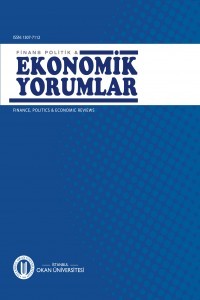Ekonomik Kompleksite ve Finansal Gelişme İlişkisi: Türkiye Örnekleminde Ampirik Bir Analiz
Günümüzde sürdürülebilir ekonomik büyümenin temel kaynağı bilgi, beceriyi içeren verimli üretim yapısıdır. Bu açıdan yapısal reformlar büyük ehemmiyet arz etmektedir. Üretim yapısının değişmesi farklı parametrelerin kullanımına bağlıdır. Bunların başında ise finansal gelişme gelmektedir. Bu çalışma, ekonomik kompleksite* (bilgi, beceri içeren sofistike mamül üretimi) ve finansal gelişme ilişkisini, 1970-2013 yılları arasında Türkiye örnekleminde incelemeyi amaçlamıştır. Çalışmada birim kök testleri yapısal kırılmaları göz önünde bulunduran Zivot ve Andrews (1992), Lee ve Strazicich (2003), Lee ve Strazicich (2013) ile gerçekleştirilmiştir.** Eş bütünleşme analizinde Maki (2012) yaklaşımı, uzun ve kısa dönem analizlerinde Dinamik En Küçük Kareler (DOLS) yöntemleri kullanılmıştır. Çalışma sonucunda finansal gelişmenin ekonomik kompleksiteyi pozitif şekilde etkilediği sonucuna ulaşılmıştır. Hata düzeltme modelinde ise hata teriminin negatif ve istatistiki olarak anlamlı olduğu görülmüştür.
Anahtar Kelimeler:
Ekonomik Kompleksite, Finansal Gelişme, Sofistike Üretim
Economic Complexity and Financial Development: An Empirical Analysis For Turkey
Today, the main source for a sustainable economic growth is an efficient production structure including capability and knowledge. In this respect, structural reforms have great importance. A change in the structure of production depends on the use of different parameters. Foremost among them, financial development comes ahead. In this study, we have aimed to investigate the relationship between the economic complexity and the financial development for Turkey over the period 1970-2013. For unit test analysis, we have used Zivot and Andrews (1992), Lee and Strazicich (2003), Lee and Strazicich (2013) analyses, taking account structural breaks, and for cointegration analysis, Maki (2012) approach, in short and long term analysis Dynamic Ordinary Least Square Method (DOLS) have been used. We have found that financial develoment has positive effect on economic complexity. In the error correction model, we have observed that error correction term is negative and statistically significant.
- ISSN: 1307-7112
- Başlangıç: 1963
- Yayıncı: İstanbul Okan Üniversitesi
